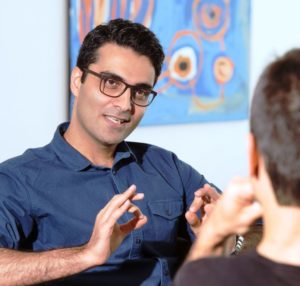
The stories of ‘illegal’ migrants and refugees held in Australian detention centres are harnessing the power of social media to shape the nation’s political debate and entire activist movements, an award-winning Flinders University writer claims.
Digital media student Amin Ansari, who has extensively published in his native Persian, has received the 2015 University of Sydney Gavin Mooney Memorial Essay Competition prize for his observations of how digital media allows asylum seekers to “find a voice”.
“Social media has made a big difference to every aspect of our lives and it has now reached a stage where is creates an opportunity for people to make changes to the world,” Flinders University Screen and Media PhD candidate Mr Ansari, 33, says.
Amin’s prize-winning essay focuses on how boat people – or asylum-seekers as he prefers to call them – are using digital media to highlight their disastrous situation in remote detention centres.
Called “Lighting the Dark Waters”, it borrows from his third novel Waltzing the Dark Waters which describes the hardships of Iranian refugees who finally arrived in Australia and begin a new life. The novel is based on interviews conducted with refugees for almost one year, including the former Inverbrackie and community detention centres in South Australia.
Talking about asylum seekers currently living in Australian remote detention centres, Amin says: “Some of their journeys were disastrous in themselves, and then they find themselves locked up and in limbo for years, in spite of being legitimate asylum-seekers.”
But what Amin found was that digital media, from videos to blogs and social media, allowed their stories to be told and heard outside the walls of detention centres.
This not only enabled them to broker contact with local Australian residents but also capitalise on the groundswell of community awareness into the plight of hundreds of other refugees in onshore and offshore Australia detention centres.
Using the theme of his Flinders University PhD topic on how digital media can be used to generate artistic and political content, Mr Ansari has noticed a strong swing towards citizen action to pressure political parties for fair treatment for detainees.
“Much more than when I came from Iran five years ago, digital media has smashed through communication barriers, enabling people to make more informed opinions about issues such as the detention of what the Government describes as ‘illegal migrants’,” he says.
The Gavin Mooney Memorial Essay Competition is a joint project of the Sydney School of Public Health at the University of Sydney, the public health blog Croakey and Inside Story, an online current affairs publication from the Swinburne Institute for Social Research.
The annual essay competition honours the work the late Professor Gavin Mooney, a health economist who was a tireless advocate for social justice in local, national and international arenas.
The 2015 theme is: “In the digital era, whose voices are being heard?”
An essay by Dr Lareen Newman, deputy director at Flinders’ Southgate Institute for Health Society and Equity, and Canadian researcher Dr Michael Gurstein was a runner-up in the competition.

